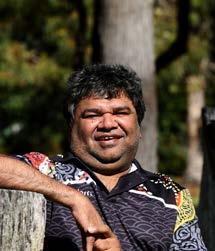
2 minute read
National News
from Sector Leader Issue 22 August/September 2021
by Queensland Aboriginal and Islander Health Council (QAIHC)
125 years in the making— Australia’s first-ever Indigenous Olympic Flag-Bearer
Basketball champion Patty Mills became the first Indigenous Australian to carry the flag into an Olympic Games opening ceremony when he marched alongside swimming star and fellow flag-bearer Cate Campbell in Tokyo. “It’s such an honour and a massive privilege,” said Mills, who was the first Indigenous person to lead Australia since we started competing back in 1896. “As a proud Kokatha, Naghiralgal and Dauareb-Meriam man it’s incredible. A very passionate moment I can feel in my bones” he said. Following the Australian Olympic Committee’s announcement in early July, Mills— who is both a Torres Strait Islander and Aboriginal man—said that while there hadn’t been any discussion about carrying the Aboriginal or Torres Strait Islander flags at the opening ceremony, he’d still bring them to Tokyo anyway. Tokyo marks his fourth Olympic Games, but he is as renowned for his work off the court as he is on it. Early in 2020, he founded Indigenous Basketball Australia, a not-for-profit entity delivering programs at a grassroots level for Aboriginal and Torres Strait Islander youths, teaching them skills for both sport and life. Mills is a vocal advocate for social justice, well known for his commitment to the Black Lives Matter movement.
Advertisement


New study finds racism leads to poorer health outcomes
A recent study from the Australian National University (ANU) has found discrimination is directly linked to poorer health outcomes in Aboriginal and Torres Strait Islander peoples. The university analysed two years’ worth of data from more than 8,000 Indigenous Australians from the national Mayi Kuwayu study, outlining experiences of racism and its direct effect on health outcomes, regardless of the person’s age, gender or where they live. Researchers found that discrimination was linked to all negative outcomes examined, including pain, life satisfaction, psychological distress, anxiety, depression, heart disease, blood pressure, cholesterol and diabetes, among others. The ANU acknowledges that while these results will be of little to no surprise to Aboriginal and Torres Strait Islander peoples across the nation, the findings can be used to advocate for support for program and policy approaches to eliminate racism. Lowitja Institute chief executive Dr Janine Mohamed also said these findings provide “undeniable evidence” that racism is linked to health outcomes. The pervasiveness of discrimination, coupled with its strong and far-ranging links to wellbeing means that there is vast potential to improve health by eliminating discrimination. This study is the first-time researchers have national evidence specific to Aboriginal and Torres Strait Islander peoples on the link between discrimination and such a broad range of health outcomes. For more information visit mkstudy.com.au








